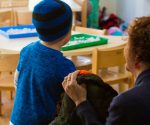Opinion Editorial – Early Childhood Education and Care
As the CEO of the leading national peak body dedicated to the best interests of young children, the focus on early childhood education and care (ECEC) in this election is very welcome. To hear the Prime Minister say during the recent leaders’ debate that he wants universal childcare to be his economic legacy indicates that this is now being seen as a serious investment in nation-building and long-term economic prosperity. The only thing that would make this even better is to have bipartisan support for high-quality, affordable and accessible ECEC—from the end of paid parental leave (12 months would be ideal) through to the transition to school.
The benefits of getting ECEC right are threefold. First, young children who receive rich, high-quality early learning experiences are more likely to thrive at school, to go on to further study and training, and to have better long-term health and mental health outcomes. Second, children at risk of social or economic disadvantage and those living with learning difficulties benefit the most from early intervention, which can significantly reduce the risk of negative life experiences and improve their education outcomes. Then there is the immediate benefit of supporting parents to participate in paid work, which increases their economic wellbeing and that of their children while also strengthening the Australian economy.
The challenges in the ECEC policy arena are to provide services everywhere they are needed at the quality standard that we know is important to children’s outcomes and in a way that is affordable for every family.
The current Child Care Subsidy is an improvement on previous models of financial support, but the requirement that both parents are working or participating at the time of application (the ‘Activity Test’) is a barrier for many families already at risk of being excluded from the workforce. The activity test has always been back to front—families often need to have children settled in early learning services before they can pursue work opportunities, not the other way around. Making workforce participation a prerequisite for subsidy makes it harder for those already doing it tough.
There also needs to be a national system of stewardship to ensure that early childhood services, including preschool/kindergarten, long day care, family day care and outside school hours care, are available to families across Australia. Access to early learning is inequitable in Australia. The Mitchell Institute’s Childcare Deserts and Oases report reveals that over a third of Australia’s children—568,700 children aged birth to four years, or 36.5%—live in ‘childcare deserts’, nine million Australians in total. ‘Childcare deserts’ are areas where there are more than three children for every ECEC centre-based place. While they are most likely to occur in regional and remote areas, ‘childcare deserts’ are in every part of Australia. Universal access to high-quality, play-based ECEC services delivers positive outcomes for children and families now and into the future. This access also provides greater opportunities to reach and support vulnerable children and families. Families, particularly women, are often wedged between the dual imperatives of workforce participation and care responsibilities. We must not mistake the use of ECEC as a free choice—for many, it is an essential service.
The system needs to continue to ensure quality, build on the National Quality Framework, and ensure that the value of high-quality ECEC is well understood by decision-makers and the general public, not just the early childhood sector and the families who access ECEC. The gains of a universal, affordable ECEC system is good for children, good for families, good for communities, and good for Australia’s economy. A quality system is built on the back of a stable and well supported workforce—correctly remunerated as early childhood professionals. An enduring investment in ECEC makes good policy sense and acknowledges the importance of high-quality educational experiences for our youngest Australians.










